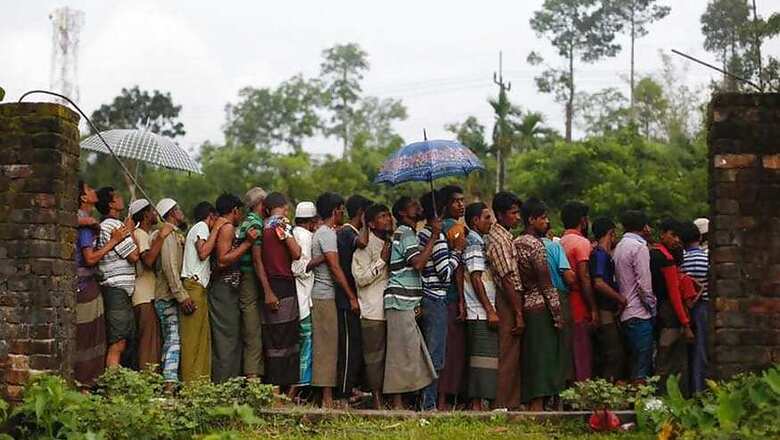
views
On the eve of the biennial Asia-Europe Meeting (ASEM) in Myanmar, Wang Yi, China's foreign minister, made a short trip to Bangladesh to discuss the Rohingya crisis. At the time, his objectives were unclear; in recent months China has largely supported Myanmar's hardliner stance that the Rohingyas are illegal immigrants and pose a national security threat.
On Monday, as diplomats from over fifty Asian and European nations descended upon Naypyidaw for the start of ASEM, they received some clarity on the visit — Wang announced a Chinese-led plan to resolve the Rohingya crisis.
Guidelines for Reconciliation
China's proposed framework consists of three distinct stages for the repatriation and long-term safety of the hundreds of thousands of Rohingya refugees in Bangladesh.
First, in an attempt to address the immediate issue, China has demanded an end to the violence in the Rakhine State. Minister Wang has indicated that a ceasefire is in place. Second, China has encouraged bilateral negotiations between Bangladesh and Myanmar over the repatriation of the refugees. In this regard, the two sides have signed a tentative agreement. Third, China has called for global investment in the Rakhine State, the Rohingyas' home, in order to foster a safe, prosperous environment for their return.
The broad proposal clearly recognises the violence in the Rakhine State as the initial obstacle to the Rohingya's return. It also emphasizes the need for major investment in the region. While the attacks against the Rohingya have been especially virulent since August, in reality, they have been ongoing for years and have devastated the local communities in the Rakhine State
While cognizant of the issue, China's plan does not contain any particularly novel propositions. It doesn't, for example, recommend how the repatriation process would work, or suggest specific policies for Myanmar to adopt to ensure the safety of the Rohingya once they return. It largely places the burden on Myanmar and Bangladesh to resolve these matters bilaterally.
Despite this lack of specificity, China has managed to establish itself as a vital mediator in what has often seemed to be an irresolvable humanitarian disaster. While other stakeholders have tried to facilitate peace, China has emerged as the only entity to bring Bangladesh and Myanmar together on this divisive issue.
China has a vested interest in the Rakhine State since it serves as a geographical gateway to the Bay of Bengal, a coveted resource hub. Beijing has already established itself as the infrastructure and economic provider in the region, and through this intervention, it also assumes the role as the primary broker of peace.
China's Emerging Soft Power
The viability of China’s proposition rests on Beijing's relationship and influence with the involved parties, particularly with Myanmar. China serves as Myanmar's primary trading partner and weapons supplier, which has led to a strong relationship between Beijing and Myanmar's influential military. Where other international actors like the U.N. have struggled to sway Myanmar's outlook on the crisis, China has a unique advantage. For Bangladesh, China's involvement lends an air of credibility to the talks and instills confidence in a sustainable resolution.
While China's intervention is a valuable boost to the resolution of the crisis, larger geostrategic interests are also at play. Through its involvement, China is making a strategic decision to gain moral authority in the region, while other powers, such as India, are sidelined.
As China has built up its economic and security capacity in the Bay of Bengal, its strategies have often been perceived as expansionist. Now, as an arbiter in this crisis, China also asserts itself as the primary norm maker and peacekeeper in the Bay of Bengal. By designing its own peace proposal, it is clear that China wants to determine the conditions of stability in the region, as well as influence the dynamics of regional relationships.
The timing of the announcement is also worth noting. Instead of introducing this proposal at the APEC or ASEAN summits, China waited until other potential mediators, like the United States, had tried and failed to resolve the conflict.
Minister Wang's visit to Bangladesh and Myanmar come on the heels of U.S. Secretary of State Rex Tillerson's trip to the region last week. While Secretary Tillerson exercised significant pressure on the peaceful resolution to the conflict, he was unable to secure a commitment from Myanmar on the future of the Rakhine State and the Rohingya. Within just a week of its involvement, China has brought both sides to the table to agree on an end to the crisis. This is a stark contrast of diplomatic authority.
Through its role in the crisis, China's interests in the Bay of Bengal are clear – it is determined to consolidate its soft power in the region and establish itself as the unilateral voice not only for security and development but also for peace and stability.
The practicality of the proposal will play out in the coming months, but if successful, it would prove to be a master class in diplomacy – where every stakeholder, particularly the arbitrator, benefits.
— The author works with The Observer Research Foundation




















Comments
0 comment